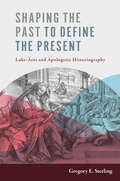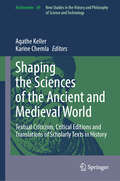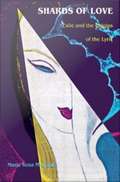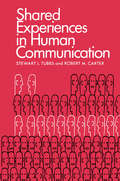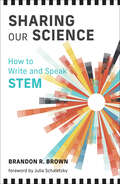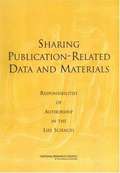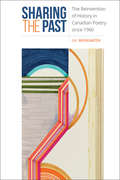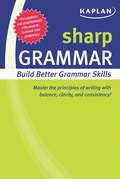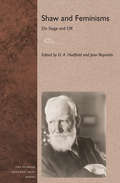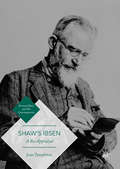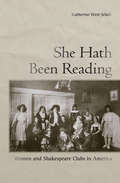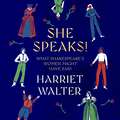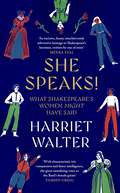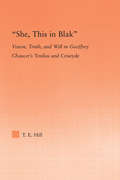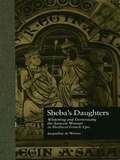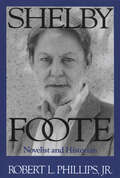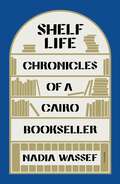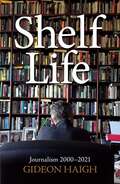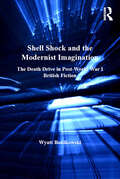- Table View
- List View
Shaping the Past to Define the Present: Luke-Acts and Apologetic Historiography
by Gregory E. SterlingUncovering ancient texts and rethinking early Christian identity with the Gospel of Luke and the Acts of the ApostlesShaping the Past to Define the Present comprises both new and revised essays by esteemed New Testament scholar Gregory E. Sterling on Jewish and early Christian historiography. A sequel to his seminal work, Historiography and Self-Definition, this volume expands on Sterling&’s reading of Luke-Acts in the context of contemporary Jewish and Greek historiography. These systematically arranged essays comprise his new and revised contributions to the field of biblical studies, exploring: the genre of apologetic historiography exemplified by Josephus and Eusebiusthe context of Josephus&’s work within a larger tradition of Eastern historiographythe initial composition and circulation of Luke and Actsthe relationship of Luke-Acts to the Septuagintthe interpretation of the Diaspora in Luke-Actsthe structure of salvation history as it is manifested in Luke-Acts Socratic influences on Luke&’s portrayal of Jesus&’s deaththe early Jerusalem Christian community as depicted in Acts compared with other Hellenized Eastern traditions such as Egyptian priests and Indian sagesthe establishment of Christianity&’s &“socially respectability&” as a guiding purpose in Luke-Acts Engaging with current critical frameworks, Sterling offers readers a comprehensive analysis of early Christian self-definition through Judeo-Christian historiography.
Shaping the Sciences of the Ancient and Medieval World: Textual Criticism, Critical Editions and Translations of Scholarly Texts in History (Archimedes #69)
by Karine Chemla Agathe KellerThis book contributes to a worldwide history of textual criticism and critical editions of ancient scientific texts. It first looks at ancient editorial practices, and at their impact on modern editions. Contributions analyze how, through time, the perception of what a text was may have changed, and influenced how scholarly texts were made accessible. The second section looks at the historical, political and social contexts within which editions and translations of ancient scientific texts were produced. Finally, the last two parts examine the specificities of editions and translations that bore on scholarly documents. Not only is there a focus on how the elements specific to scientific texts—such as diagrams and numbers—were treated, but case studies analyzing the specific work carried out to edit mathematical and astronomical texts of the past are also offered to the reader. The scholarship displayed in this work lays the foundation for further studies on the history of critical editions and raises questions to those who make scholarly translations and critical editions today.
Shards of Love: Exile and the Origins of the Lyric
by María Rosa MenocalWith the Spanish conquest of Islamic Granada and the expulsion of the Jews from Spain, the year 1492 marks the exile from Europe of crucial strands of medieval culture. It also becomes a symbolic marker for the expulsion of a diversity in language and grammar that was disturbing to the Renaissance sensibility of purity and stability. In rewriting Columbus's narrative of his voyage of that year, Renaissance historians rewrote history, as was often their practice, to purge it of an offending vulgarity. The cultural fragments left behind following this exile form the core of Shards of Love, as Mara Rosa Menocal confronts the difficulty of writing their history. It is in exile that Menocal locates the founding conditions for philology--as a discipline that loves origins--and for the genre of love songs that philology reveres. She crosses the boundaries, both temporal and geographical, of 1492 to recover the "original" medieval culture, with its Mediterranean mix of European, Arabic, and Hebrew poetics. The result is a form of literary history more lyrical than narrative and, Menocal persuasively demonstrates, more appropriate to the Middle Ages than to the revisionary legacy of the Renaissance. In discussions ranging from Eric Clapton's adaption of Nizami's Layla and Majnun, to the uncanny ties between Jim Morrison and Petrarch, Shards of Love deepens our sense of how the Middle Ages is tied to our own age as it expands the history and meaning of what we call Romance philology.
Shared Experiences in Human Communication
by Stewart L. TubbsA novel approach to traditional subjects, the wide variety of opinions, and the extensive introductory material lift this book out of the ordinary “readings" class, and will reward the reader with understanding and appreciation of a complex subject. This collection of 37 provocative selections on human communication shares with the reader the experience and insights of some of the best minds in the discipline. The selections for the most part deal with traditional communication topics in a novel way. For example, in the chapter on verbal communication, there is a selection on profane language; in the chapter on nonverbal communication, there is a section entitled “The Silent Language of Love”; in the chapter on small group communication, there’s the Parkinson article on laws in groups; and in the chapter on mass communication, there’s one on today’s interest in sexually oriented magazines. The entire spectrum of topics usually found in beginning courses in speech communication is here. An extensive Section Two includes discussion on the psychological and transactional analysis views of communication. A brief introduction precedes each section focusing on the key ideas of each reading. Sources include the Journal of Communication, Industry Week, Journalism Quarterly, Psychology Today, Supervisory Management, Journal of Social Issues, Harvard Business Review, and Today's Speech.
Shared Reading Coaching Tool: 3 Days, 1 Book, 3 Times Through
by Marsha SpearsThis handy resource can be used by teachers, classroom volunteers, and parents for large-or small-group shared reading instruction. Scripted language, fun activities, and sample questions on topics such as directionality, text conventions, high-frequency words, and comprehension provide the instructor with reading strategies to support beginning and advanced readers.
Sharing Our Science: How to Write and Speak STEM
by Brandon R. BrownA personal, practical, and inspirational guide to written and oral STEM communications for scientists and technical professionals.In Sharing Our Science, scientist-turned-writing teacher Brandon Brown offers an eminently useful guidebook for STEM practitioners looking to communicate their technical work to either a technical or a broader audience. Professionals are increasingly required to communicate their work through blogs, podcasts, and newsletters and to submit to traditional media. After seeing his colleagues struggle to find a writing guide that tackled the unique challenges of writing and speaking about scientific topics, Brown set out to write the definitive handbook to assist STEM students, scientists, engineers, and tech workers alike.In this practical and relevant book, Brown uses his experience as a proven science communicator to cover three levels of writing: fundamental craft considerations, such as narrative tension, structure, sentences, and audience; unique scientific considerations, such as conveying numbers and utilizing metaphors; and finally, social considerations, such as public speaking and writing inside and outside of silos. In place of a reference manual, Brown&’s engaging narrative guide clarifies the fundamental principles that impact all scientific communication tasks, from white papers and slide decks to Zoom meetings and emails. Sharing Our Science represents the culmination of a lifetime of writing, research, and teaching that will enrich scientists&’ careers and illuminate the ways in which science is done and conveyed to the world.
Sharing Publication-related Data And Materials: Responsibilities Of Authorship In The Life Sciences
by Committee on Responsibilities of Authorship in the Biological SciencesBiologists communicate to the research community and document their scientific accomplishments by publishing in scholarly journals. This report explores the responsibilities of authors to share data, software, and materials related to their publications. In addition to describing the principles that support community standards for sharing different kinds of data and materials, the report makes recommendations for ways to facilitate sharing in the future.
Sharing the Past: The Reinvention of History in Canadian Poetry since 1960
by J.A. WeingartenSharing the Past is an unprecedentedly detailed account of the intertwining discourses of Canadian history and creative literature. When social history emerged as its own field of study in the 1960s, it promised new stories that would bring readers away from the elite writing of academics and closer to the everyday experiences of people. Yet, the academy’s continued emphasis on professional distance and objectivity made it difficult for historians to connect with the experiences of those about whom they wrote, and those same emphases made it all but impossible for non-academic experts to be institutionally recognized as historians. Drawing on interviews and new archival materials to construct a history of Canadian poetry written since 1960, Sharing the Past argues that the project of social history has achieved its fullest expression in lyric poetry, a genre in which personal experiences anchor history. Developing this genre since 1960, Canadian poets have provided an inclusive model for a truly social history that indiscriminately shares the right to speak authoritatively of the past.
Shark!
by Jerrill ParhamNIMAC-sourced textbook. Advisory: Bookshare has learned that this book offers only partial accessibility. We have kept it in the collection because it is useful for some of our members. To explore further access options with us, please contact us through the Book Quality link on the right sidebar. Benetech is actively working on projects to improve accessibility issues such as these.
Sharp Grammar
by KaplanFeatures: A 10-question quiz in every chapter to show readers where they need the most help. Information on grammar, sentence structure, style, usage, punctuation, and mechanics. A variety of practice exercises with detailed answer explanations for every topic. A recognition and recall chapter test that includes material from the entire chapter to once again reinforce what the reader has learned on a large scale. Detailed answer explanations follow the chapter test. Chapter summaries for easy review.
Shaw and Feminisms: On Stage and Off (Florida Bernard Shaw)
by D. A. Hadfield Jean Reynolds“A worthy successor to Fabian Feminist. Shaw’s influence on the self-image and public standing of women has been immense, both in his time and in our own, yet Shaw has also been widely and sometimes appallingly misunderstood. This book should help clarify the complexities of the issue and provoke continued reflection and debate.”—Julie A. Sparks, San Jose State University“This collection suggests that Shaw’s views of women are still relevant and provocative and that the dialogue with Shaw is far from over.”—Sally Peters, author of Bernard Shaw: The Ascent of the Superman When offstage actions contradict a playwright’s onstage message, literary study gets messy. In his personal relationships, George Bernard Shaw was often ambivalent toward liberated women—surprisingly so, considering his reputation as one of the first champions of women’s rights. His private attitudes sit uncomfortably beside his public philosophies that were so foundational to first-wave feminism. Here, Shaw’s long-recognized influence on feminism is reexamined through the lens of twenty-first-century feminist thought as well as previously unpublished primary sources. New links appear between Shaw’s writings and his gendered notions of physicality, pain, performance, nationalism, authorship, and politics. The book’s archival material includes previously unpublished Shaw correspondence and excerpts from the works of his feminist playwright contemporaries. Shaw and Feminisms explores Shaw’s strong female characters, his real-life involvement with women, and his continuing impact on theater and politics today. A volume in the Florida Bernard Shaw Series, edited by R. F. DietrichContributors: Tracy J. R. Collins | Leonard W. Conolly | Virginia Costello | D. A. Hadfield | Brad Kent | Kay Li | Jackie Maxwell | John M. McInerney | Michel Pharand | Jean Reynolds | Margaret D. Stetz | Lawrence Switzky | Rodelle Weintraub | Ann Wilson
Shaw's People: Victoria to Churchill
by Stanley WeintraubShaw's opinions of, or actual relationships with notable Victorians including the Queen. Includes extensive quotes from a man whose life spanned later Victorian Britain and the first fifty years of the twentieth century.
Shaw’s Ibsen: A Re-Appraisal (Bernard Shaw and His Contemporaries)
by Joan TempletonThis book argues that Shaw was a masterful reader of Ibsen's plays both as texts and as the cornerstone of the modern theatre. Dismantling the notion that Shaw distorted Ibsen to promote his own view of the world, and establishing Shaw’s initial interest in Ibsen as the poet of Peer Gynt, it chronicles Shaw’s important role in the London Ibsen campaign and exposes the falsity of the tradition that Shaw branded Ibsen as a socialist. Further, this study shows that Shaw’s famous but maligned The Quintessence of Ibsenism reflects Ibsen’s own anti-idealist notion of his work and argues that Shaw’s readings of Ibsen’s plays are pioneering analyses that anticipate later criticism. It offers new readings of Shaw’s “Ibsenist” plays as well as a comprehensive account of Ibsen’s importance for Shaw’s dramatic criticism, from his early journalism to Our Theatres of the Nineties, both as a weapon against the inanities of the Victorian stage and as the standard bearer for modernism.
She Hath Been Reading: Women and Shakespeare Clubs in America
by Katherine West ScheilIn the late nineteenth century hundreds of clubs formed across the United States devoted to the reading of Shakespeare. From Pasadena, California, to the seaside town of Camden, Maine; from the isolated farm town of Ottumwa, Iowa, to Mobile, Alabama, on the Gulf coast, Americans were reading Shakespeare in astonishing numbers and in surprising places. Composed mainly of women, these clubs offered the opportunity for members not only to read and study Shakespeare but also to participate in public and civic activities outside the home. In She Hath Been Reading, Katherine West Scheil uncovers this hidden layer of intellectual activity that flourished in American society well into the twentieth century.Shakespeare clubs were crucial for women's intellectual development because they provided a consistent intellectual stimulus (more so than was the case with most general women's clubs) and because women discovered a world of possibilities, both public and private, inspired by their reading of Shakespeare. Indeed, gathering to read and discuss Shakespeare often led women to actively improve their lot in life and make their society a better place. Many clubs took action on larger social issues such as women's suffrage, philanthropy, and civil rights. At the same time, these efforts served to embed Shakespeare into American culture as a marker for learning, self-improvement, civilization, and entertainment for a broad array of populations, varying in age, race, location, and social standing.Based on extensive research in the archives of the Folger Shakespeare Library and in dozens of local archives and private collections across America, She Hath Been Reading shows the important role that literature can play in the lives of ordinary people. As testament to this fact, the book includes an appendix listing more than five hundred Shakespeare clubs across America.
She Speaks!: What Shakespeare's Women Might Have Said
by Harriet WalterNew parts for thirty of Shakespeare's women, letting them speak their minds, written by famed stage and screen actress, Dame Harriet Walter DBE'Bold and original... a book that anyone who cares about Shakespeare will want to own, and share' JAMES SHAPIRO'With her gravitas, empathy, intellect and absolute belly laugh wit, the unheard voices soar. A real celebration of her life and art' PHYLLIDA LLOYD'Harriet Walter's years of inhabiting and imbibing so many of those great roles gives her a special licence to speak for them. But the wit of these delightful poems also belies frustration, exasperation, and like a true "Lover's Complaint", real affection' GREG DORANDame Harriet Walter, renowned for her wonderful portrayals in Succession and Killing Eve, among others, is one of Britain's most esteemed Shakespearean actors. Now, having played most of Shakespeare's female characters, audaciously, she lets them speak their minds.With new parts for thirty Shakespearean women, written in 'Shakespearean' verse and prose, Harriet Walter goes between the lines of the plays to let us hear what she imagines - sometimes playfully and sometimes searchingly - these women were really thinking.Here's what Gertrude longed to say; why Lady MacBeth felt she should be King; how Juliet's nurse bemoaned her loss; why Ariel is anxious about freedom and what Cleopatra's handmaidens really thought of her. Ophelia surprises us, Olivia surprises herself and Miranda glimpses the future; these pieces are alongside other brilliant insights, from the servants to the sovereigns.Harriet Walter says 'Shakespeare's mind and words have been the backbone of our culture and they have seeped into my bloodstream over the decades that I have been privileged to speak them. As Ben Jonson said, he is a man for all times, but he is also a man of his time and there's the rub. Though his empathy for his female creations is miraculous, his plays mirror the hierarchy and patriarchy of his day with the result that women are seldom centre stage, have far fewer lines, and their function in the plot is always and solely in relation to a man. But not in these pages...'
She Speaks!: What Shakespeare's Women Might Have Said
by Harriet WalterNew parts for thirty of Shakespeare's women, letting them speak their minds, written by famed stage and screen actress, Dame Harriet Walter DBE'Bold and original... a book that anyone who cares about Shakespeare will want to own, and share' JAMES SHAPIRO'With her gravitas, empathy, intellect and absolute belly laugh wit, the unheard voices soar. A real celebration of her life and art' PHYLLIDA LLOYD'Harriet Walter's years of inhabiting and imbibing so many of those great roles gives her a special licence to speak for them. But the wit of these delightful poems also belies frustration, exasperation, and like a true "Lover's Complaint", real affection' GREG DORANDame Harriet Walter, renowned for her wonderful portrayals in Succession and Killing Eve, among others, is one of Britain's most esteemed Shakespearean actors. Now, having played most of Shakespeare's female characters, audaciously, she lets them speak their minds.With new parts for thirty Shakespearean women, written in 'Shakespearean' verse and prose, Harriet Walter goes between the lines of the plays to let us hear what she imagines - sometimes playfully and sometimes searchingly - these women were really thinking.Here's what Gertrude longed to say; why Lady MacBeth felt she should be King; how Juliet's nurse bemoaned her loss; why Ariel is anxious about freedom and what Cleopatra's handmaidens really thought of her. Ophelia surprises us, Olivia surprises herself and Miranda glimpses the future; these pieces are alongside other brilliant insights, from the servants to the sovereigns.Harriet Walter says 'Shakespeare's mind and words have been the backbone of our culture and they have seeped into my bloodstream over the decades that I have been privileged to speak them. As Ben Jonson said, he is a man for all times, but he is also a man of his time and there's the rub. Though his empathy for his female creations is miraculous, his plays mirror the hierarchy and patriarchy of his day with the result that women are seldom centre stage, have far fewer lines, and their function in the plot is always and solely in relation to a man. But not in these pages...'
She Speaks!: What Shakespeare's Women Might Have Said
by Harriet WalterNew parts for thirty of Shakespeare's women, letting them speak their minds, written by famed stage and screen actress, Dame Harriet Walter DBE'Bold and original... a book that anyone who cares about Shakespeare will want to own, and share' JAMES SHAPIRO'With her gravitas, empathy, intellect and absolute belly laugh wit, the unheard voices soar. A real celebration of her life and art' PHYLLIDA LLOYD'Harriet Walter's years of inhabiting and imbibing so many of those great roles gives her a special licence to speak for them. But the wit of these delightful poems also belies frustration, exasperation, and like a true "Lover's Complaint", real affection' GREG DORANDame Harriet Walter, renowned for her wonderful portrayals in Succession and Killing Eve, among others, is one of Britain's most esteemed Shakespearean actors. Now, having played most of Shakespeare's female characters, audaciously, she lets them speak their minds.With new parts for thirty Shakespearean women, written in 'Shakespearean' verse and prose, Harriet Walter goes between the lines of the plays to let us hear what she imagines - sometimes playfully and sometimes searchingly - these women were really thinking.Here's what Gertrude longed to say; why Lady MacBeth felt she should be King; how Juliet's nurse bemoaned her loss; why Ariel is anxious about freedom and what Cleopatra's handmaidens really thought of her. Ophelia surprises us, Olivia surprises herself and Miranda glimpses the future; these pieces are alongside other brilliant insights, from the servants to the sovereigns.Harriet Walter says 'Shakespeare's mind and words have been the backbone of our culture and they have seeped into my bloodstream over the decades that I have been privileged to speak them. As Ben Jonson said, he is a man for all times, but he is also a man of his time and there's the rub. Though his empathy for his female creations is miraculous, his plays mirror the hierarchy and patriarchy of his day with the result that women are seldom centre stage, have far fewer lines, and their function in the plot is always and solely in relation to a man. But not in these pages...'
She, this in Blak: Vision, Truth, and Will in Geoffrey Chaucer's Troilus and Ciseyde (Studies in Medieval History and Culture)
by Thomas HillShe, This in Blak takes a fresh look at Chaucer's great Trojan romance, Troilus and Criseyde, in light of recent scholarship on late scholastic discourses on representation and causality as they pertain to human perception and judgment. This study also contributes to a growing literature on the impact of scholastic psychological theory upon contemporary cultural forms by examining the way in which late medieval accounts of perception and cognition can illuminate the construction of the poem's subjects, including one of the most compelling and controversial figures in medieval literature, Chaucer's Criseyde. By examining Chaucer's depiction of Troilus, Pandarus, and Criseyde within this contemporary cultural context, She, This in Blak offers a better grounded and more historically illuminating view of the poem than is provided by psychological readings based on modern constructions of intentionality.
Sheba's Daughters: Whitening and Demonizing the Saracen Woman in Medieval French Epic
by Jacqueline de WeeverExploring how the depiction of otherness or alterity during the Middle Ages became problematic in the aesthetics of the Romance epics written during the centuries of the Crusades, this book offers a vital contribution to the growing interest in the way foreign women are presented in the texts of the Latin West and will be of consuming interest to students in women's studies, cultural studies, and medieval literature.The texts considered are written in the major European languages of the time and range from the Song of Songs through Geoffrey of Vinsauf's Poetria Nova to such epics and romances as Erec et Enide,Doon de Maience, Fierabras, La Prise d'Orange, Ars Versificatoria, The Sowdone of Babylone, and Parzifal.
Shelby Foote: Novelist and Historian
by Robert L. Phillips Jr.Called the greatest Civil War historian, Shelby Foote began his career as a novelist whose powerful works of fiction rose out of his closeness to life and culture in his native region, the Mississippi Delta country. Later in his career he transformed modern historical prose by his keen sense of the novel. His artistic distance from the elements of regionalism that lie at the heart both of his novels and of his history writing gives his prose great narrative force. This perceptive study fills the genuine need for a sound critical appreciation of Foote the novelist. After he appeared as a sage commentator in the PBS series The Civil War, the popular acclaim that catapulted Shelby Foote the historian to even greater eminence as an American oracle renewed much deserved interest in his novels and in critically rich assessments such as this one.
Shelf Life: Chronicles of a Cairo Bookseller
by Nadia Wassef“As a bookseller, I loved Shelf Life for the chance to peer behind the curtain of Diwan, Nadia Wassef’s Egyptian bookstore—the way that the personal is inextricable from the professional, the way that failure and success are often lovers, the relationship between neighborhoods and books and life. Nadia’s story is for every business owner who has ever jumped without a net, and for every reader who has found solace in the aisles of a bookstore.”—Emma Straub, author of All Adults Here“Shelf Life is such a unique memoir about career, life, love, friendship, motherhood, and the impossibility of succeeding at all of them at the same time. It is the story of Diwan, the first modern bookstore in Cairo, which was opened by three women, one of whom penned this book. As a bookstore owner I found this fascinating. As a reader I found it fascinating. Blunt, honest, funny.”—Jenny Lawson, author of Broken (in the best possible way)The warm and winning story of opening a modern bookstore where there were none, Shelf Life: Chronicles of a Cairo Bookseller recounts Nadia Wassef’s troubles and triumphs as a founder and manager of Cairo-based DiwanThe streets of Cairo make strange music. The echoing calls to prayer; the raging insults hurled between drivers; the steady crescendo of horns honking; the shouts of street vendors; the television sets and radios blaring from every sidewalk. Nadia Wassef knows this song by heart.In 2002, with her sister, Hind, and their friend, Nihal, she founded Diwan, a fiercely independent bookstore. They were three young women with no business degrees, no formal training, and nothing to lose. At the time, nothing like Diwan existed in Egypt. Culture was languishing under government mismanagement, and books were considered a luxury, not a necessity. Ten years later, Diwan had become a rousing success, with ten locations, 150 employees, and a fervent fan base.Frank, fresh, and very funny, Nadia Wassef’s memoir tells the story of this journey. Its eclectic cast of characters features Diwan’s impassioned regulars, like the demanding Dr. Medhat; Samir, the driver with CEO aspirations; meditative and mythical Nihal; silent but deadly Hind; dictatorial and exacting Nadia, a self-proclaimed bitch to work with—and the many people, mostly men, who said Diwan would never work.Shelf Life is a portrait of a country hurtling toward revolution, a feminist rallying cry, and an unapologetic crash course in running a business under the law of entropy. Above all, it is a celebration of the power of words to bring us home.
Shelf Life: Journalism 2000-2021
by Gideon HaighFew journalists exemplify the creed &‘without fear or favour&’ like Gideon Haigh. Shelf Life selects from twenty-one years of writing on myriad subjects by one of our clearest thinkers, sharpest stylists and most curious journalists. Architecture and airline food. Depression and doodling. Goya and Grossman. Weegee and Wire. When not wiring about cricket, Gideon Haigh has enjoyed taking journalism on unexpected journeys, where curiosity calls, into the past and future as well as the present. Edited by Russell Jackson, Shelf Life samples his work from the last two decades: essays, reportage, reviews, crisp analyses, deep dives into history, of no camp, and independent of the news cycle, from his shelves to yours.
Shelf Life: Romance, Mystery, Drama, and other Page-Turning Adventures from a Year in a Bookstore
by Suzanne Strempek SheaSUZANNE STREMPEK SHEA, after being diagnosed and going through the treatment from cancer, takes a job in a bookstore. As an author, she expects to be a spy in the store, learning how to better sell her books. what she finds is a family atmosphere and a place where books find a good home.
Shell Shock and the Modernist Imagination: The Death Drive in Post-World War I British Fiction
by Wyatt BonikowskiLooking closely at both case histories of shell shock and Modernist novels by Ford Madox Ford, Rebecca West, and Virginia Woolf, Wyatt Bonikowski shows how the figure of the shell-shocked soldier and the symptoms of war trauma were transformed by the literary imagination. Situating his study with respect to Freud’s concept of the death drive, Bonikowski reads the repetitive symptoms of shell-shocked soldiers as a resistance to representation and narrative. In making this resistance part of their narratives, Ford, West, and Woolf broaden our understanding of the traumatic effects of war, exploring the possibility of a connection between the trauma of war and the trauma of sexuality. Parade’s End, The Return of the Soldier, and Mrs. Dalloway are all structured around the relationship between the soldier who returns from war and the women who receive him, but these novels offer no prospect for the healing effects of the union between men and women. Instead, the novels underscore the divisions within the home and the self, drawing on the traumatic effects of shell shock to explore the link between the public events of history and the intimate traumas of the relations between self and other.
Shell Shock, Memory, and the Novel in the Wake of World War I
by Trevor DodmanShell Shock, Memory, and the Novel in the Wake of World War I explores the narrative traces, subaltern faces, and commemorative spaces of shell shock in wartime and postwar novels by Mulk Raj Anand, Ford Madox Ford, Mary A. Ward, George Washington Lee, Ernest Hemingway, F. Scott Fitzgerald and Christopher Isherwood. This book argues that World War I novels serve as an untapped source of information about shell shock, and renews our present understanding of the condition by exploring the nexus of shell shock and practices of commemoration. Shell shock novelists testify to the tenaciousness and complexity of the disorder, write survivors into visibility, and articulate the immediacy of wounds that remain to be seen. This book helps readers understand more fully the extent to which shell shock continues to shape and trouble modern memories of the First World War.
